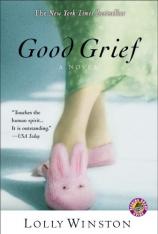Reading Group Guide
Discussion Questions
Good Grief

1. Clearly everyone doesn't go through the grieving process in the same way and at the same speed. What does Sophie's experience tell us about grief? How do Sophie and Marion differ when it comes to grieving? What aspects of Sophie's grief can you relate to? Are we sometimes too quick to tell people to "get over it," and move on with their grief? How might we be more comforting to those who are struggling with grief?
2. The theme of illness or decay extends beyond Ethan's death. At one point, Sophie says, "I look at the house and all I see is cancer." Her house then becomes literally much emptier than when Ethan was alive. Do you think that the death of a loved one casts a shadow on a living space? What other clues does the author give that Sophie must leave the house she shared with Ethan?
3. As a young widow, Sophie feels alienated at times from other widows and widowers in her therapy sessions, and among her friends. Does her youth make it more difficult for others to sympathize with her? Along these lines, does her youth make it harder for her to cope with Ethan's death?
4. Crystal is one of the most intriguing characters in the novel in that she both provides comfort to Sophie and gets under her skin. Do you think Crystal helps restore a sense of control in Sophie's life, or does she take it away because she is so trying of Sophie's patience?
5. Low self-esteem is a huge problem for both Sophie and Crystal, but they cope with it differently. How does each character deal with their self-esteem and confidence issues? How does Sophie's experience with low self-esteem help Crystal overcome her cycle of self-destruction?
6. Sophie's mother dies when she is a young girl. Yet for someone who grew up without a mother, she demonstrates an incredible maternal instinct. Towards the end of Ethan's illness, Sophie was a caregiver. And at the end of the novel Sophie becomes a surrogate mother for Crystal and Marion (and even Drew in the last scene) -once again she is in the position of being a maternal caregiver. Is being a motherly-type figure therapeutic to Sophie? Does being a parental figure help Sophie overcome Ethan's death? Aside from her father's visit, do we ever see Sophie allowing herself to be taken care of?
7. At one point in the novel Sophie says, "Here's what happens in the movies: A single woman moves to a small town in the country to start over, and a rugged Sam Shepard kind of guy-lean and muscular, a cleft chin, and a thirty-three-inch waist in faded Levis's- finds her." Yet at the end of the novel she's involved with Drew, a handsome actor. Did you find that unbelievable or disappointing? Or did you think that was okay since clearly her knight on a white horse has already revealed that he has some commitment issues?
8. The concept of the non-traditional family manifests itself several times in the novel. After Ethan's death, Sophie finds herself with her father living 3,000 miles away and no other immediate relatives to turn to. By the end of the novel, how has Sophie's notion of a "family" changed? Who constitutes this new family? Can this new family fill the void that Ethan left?
9. Sophie clings to Ethan's possessions and becomes very attached to his ski sweater over the course of the story, almost personifying it. Finally, she decides to part with most of Ethan's belongings, even the sweater. Why is it so difficult to part with the physical things left behind when someone dies? Does wearing and holding onto this sweater help Sophie overcome Ethan's death, or does it impede her progress of moving on with her life? Is Jasper a good home for Ethan's sweater, or should Sophie have kept it?
10. Do you think the expression "good grief" is apt? Is a grieving period necessary in order to recover and move on? And do you think someone ever moves on from a loss such as one that Sophie experienced?
11. The notion of loyalty and commitment comes up throughout the book: Sophie's loyalty towards Ethan and her guilt about starting a new relationship with Drew, Ruth's commitment to her failed marriage and reluctance to let it go, even Marion, with her Alzheimer's, maintains a committed belief that Ethan is alive. When is it okay to acknowledge that something - a relationship, a person - has died and that the person left behind can start anew?
Good Grief
- Publication Date: April 4, 2005
- Genres: Fiction
- Paperback: 368 pages
- Publisher: Grand Central Publishing
- ISBN-10: 0446694843
- ISBN-13: 9780446694841








